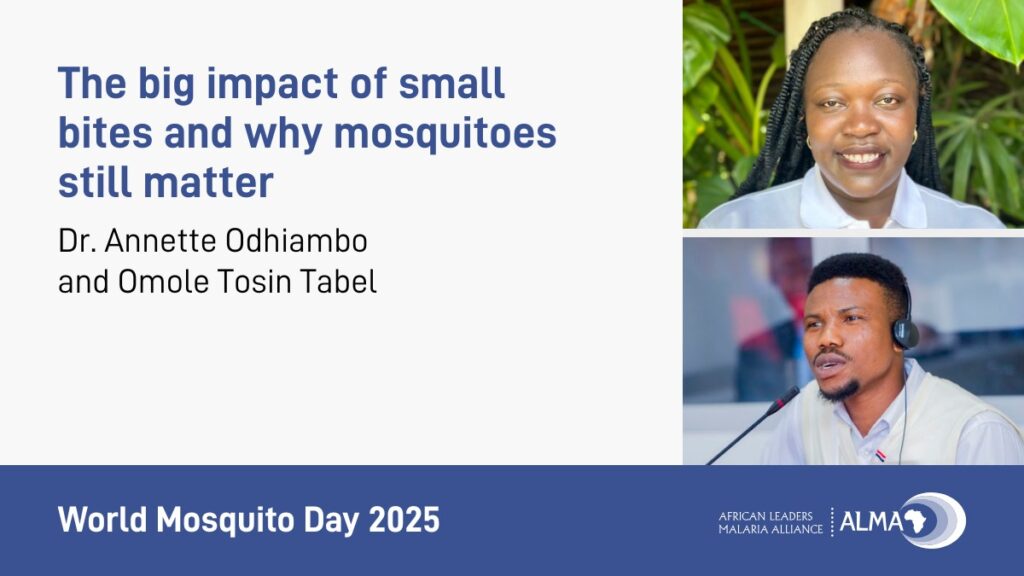The big impact of small bites and why mosquitoes still matter
Published: Wednesday, 20 August 2025
By Dr. Annette Odhiambo (ALMA Youth Advisory Council member, Kenya) and Omole Tosin Tabel (Nigeria Malaria and NTD Youth Corps)
It is almost unimaginable what a tiny insect is capable of. Yet here we are, talking about mosquitoes on a day marked across the globe every 20th of August. World Mosquito Day commemorates a key scientific discovery made by British doctor Sir Ronald Ross in 1897, confirming that malaria is transmitted to humans through the bite of an infected female Anopheles mosquito. That single finding has since led to decades of research and innovations to control malaria mosquitoes: from indoor residual spraying to dual insecticide treated nets, and, moving forward, groundbreaking innovations like gene drive technologies.
World Mosquito Day provides an opportunity to highlight the ongoing impact mosquitoes have on our communities today. Mosquito-borne diseases remain some of the most urgent and complex public health challenges of our time. Whether it is malaria, dengue, chikungunya, yellow fever, Zika, or lymphatic filariasis, these diseases cause serious illness and death. They stretch our health systems, disrupt education and livelihoods, and keep families trapped in cycles of illness and poverty.

In Africa, the burden is especially high. During the rainy season, mosquito populations surge, followed by spikes in malaria cases. Outbreaks of dengue and chikungunya are being reported in regions where they were previously unknown. And with climate change and severe flooding the threat is spreading. Warmer temperatures and changing rainfall patterns are expanding the zones where mosquitoes can thrive.
Our work in the Youth Corps has shown us just how present and persistent these challenges are in our countries. In Kenya, for example, in Busia County, youth champions have led community campaigns to remove mosquito breeding sites. We have seen similar work in Burkina Faso, Cameroon, and Zambia. In Nigeria, in Bauchi and Calabar, young people have worked alongside local health officials to share prevention messages and support outbreak surveillance. These are simple but powerful actions that make a difference.
We also know that technology has a role to play. Digital surveillance tools, mosquito mapping apps, and innovations like gene drive technology offer new ways to tackle an age-old problem. Gene drive, in particular, is a cutting-edge approach currently being researched in Africa, that works by altering mosquito populations so they can no longer transmit malaria or are no longer able to reproduce. This could offer a long-term, sustainable way to reduce malaria transmission in Africa. But even the most advanced science cannot succeed without public understanding, trust and support. That is why awareness and engagement at the local level remain just as important as the work in the laboratory.
So this World Mosquito Day, we are calling on more young people to get involved. You do not need to be a doctor or scientist to help prevent mosquito-borne diseases. Start by checking your surroundings for standing water. Talk to your neighbours about the importance of using mosquito nets and seeking treatment early. Share prevention messages online or in your local language.
There are Youth Corps in 17 African countries, and if you are in one of them, you can get involved through forums supported by ministries of health, national malaria and NTD programmes, ALMA, and other partner platforms. Every action, no matter how small, adds up.The mosquito may be tiny, but its impact is enormous. So must be our response.
About the authors
Dr. Annette Odhiambo is a medical doctor and the East Africa Lead of the ALMA Youth Advisory Council (AYAC), based in Kenya. Omole Tosin Tabel is the Co-Country Lead of the Malaria and NTD Youth Corps in Nigeria. Both are passionate advocates for youth-led action in public health and are actively engaged in efforts to end mosquito-borne diseases in their communities and beyond.